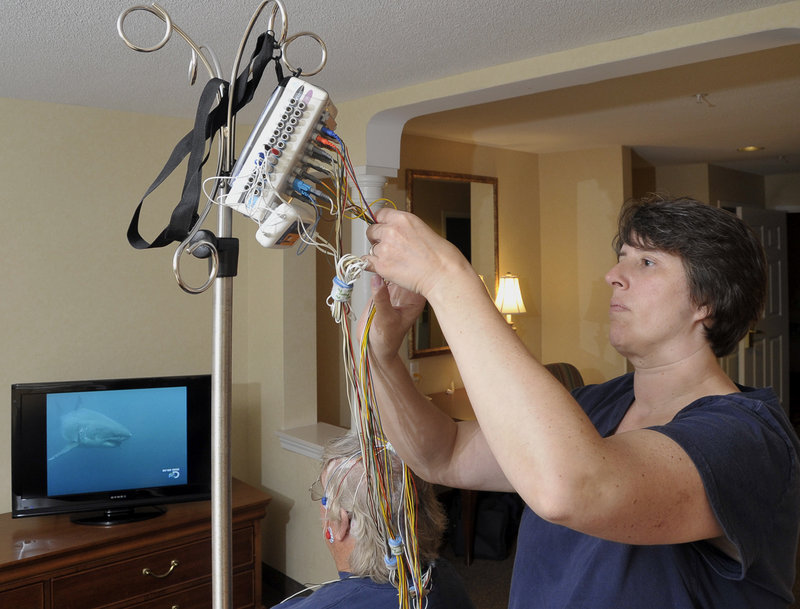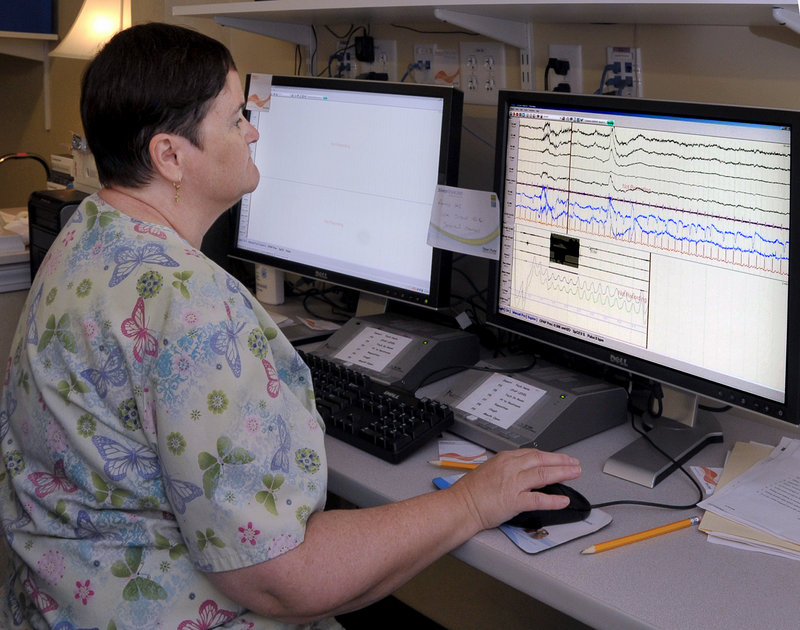For someone seeking a solution to a sleep problem, going to a hospital-based sleep lab is a necessary evil.
Patients are unlikely to rest easy in a hospital setting, but doctors have to observe how they sleep and record data like respiration rates and brain waves to make diagnoses and determine the best treatment.
Southern Maine Medical Center in Biddeford is working to make the process of lying down with electrodes attached and being watched by video cameras a bit more conducive to actually sleeping.
The hospital has teamed up with the Comfort Suites motel across Route 111 to set aside four rooms and outfit them with the monitoring equipment needed to create a sleep lab and do sleep studies.
“There’s a big difference (between a hospital and) walking into a new Comfort Suites and stepping into a room,” said Sue Hadiaris, a spokeswoman for the hospital, which opened the sleep lab this summer.
Hadiaris said the hospital began looking for alternatives to its two-bed, in-hospital sleep center a few years ago, as demand for the service increased. Greater awareness of disorders such as sleep apnea and narcolepsy has increased demand for the sleep center, from 222 patient stays in 2005-06 to 655 last year.
Hadiaris said patients typically check in at the motel around 6:30 p.m. and settle into their rooms. After an hour or so, technicians fit them with electrodes to monitor breathing, heart rate and brain activity. The data, and video from a camera mounted in the room, are fed to a separate room.
Patients are encouraged to watch television, read and relax and go to bed at their normal time, Hadiaris said. “The idea is to have them mimic their normal evening activities as much as possible,” she said.
There was a months-long wait to use the sleep lab in the hospital, Hadiaris said. Adding the motel rooms has reduced that wait to weeks. The lab operates six nights a week.
Dr. Richard Kahn, director of the sleep lab, said the additional beds are important as a growing number of people seek treatment for sleep disorders.
Unlike medical problems that are apparent during waking hours, sleep disorders must be diagnosed through sleep study because those hours are “this unknown part of our lives,” Kahn said.
Major sleep disorders include sleep apnea, narcolepsy and restless leg syndrome.
Sleep apnea, he said, affects up to 15 percent of men and a slightly smaller percentage of women. A person who suffers from it stops breathing because their upper airway closes, so the person wakes up, sometimes as often as 15 times an hour, to breathe.
Treatments include weight loss, devices that pull the jaw forward, a continuous positive airway pressure device, or surgery, Kahn said.
Narcolepsy, he said, is a dangerous condition in which people can fall fast asleep in the middle of the day. Restless leg syndrome is an involuntary movement of the legs when a person is trying to sleep, which prevents deep sleep. Both can be treated with medication, therapy or both.
All three of the major disorders can be detected by monitoring respiration and heart rates, analyzing brain activity to determine the depth of sleep, and using video to monitor how people move when they are trying to sleep, Kahn said.
Carol Faulkner, 76, of Kennebunk said she knew she had sleep apnea because of an earlier diagnosis at another sleep lab, but she went to Kahn and Southern Maine Medical Center because she wasn’t able to use the machines that had been provided for treatment.
She said she appreciates the setting of the hospital’s sleep lab because her niece, who lives in Kittery, agreed to drive her to her session and decided it would be easier to stay in the motel than to drive back and forth. Faulkner’s grandnieces came along and swam in the motel pool.
“If you can call a test experience nice, it was,” she said, noting that she didn’t feel relaxed in the first lab where she went.
Edward Grandi, executive director of the American Sleep Apnea Association, said there’s a growing trend for hospitals to team up with hotels and motels to create sleep labs.
He said the cost is usually less than what it costs to expand a hospital, and outfitting a hotel room with the necessary equipment is easy and less expensive.
It’s often attractive to hotels and motels, he said, because the recession has left many with available rooms.
Northwestern University and the University of California-San Francisco recently took over whole floors of hotels for sleep labs, he said. Many hospitals with sleep labs are outfitting them like hotel rooms to make patients more comfortable.
“There’s a growing awareness of the importance of sleep, and it’s more important that people discover what’s causing bad sleep,” Grandi said. Motel-based sleep labs can make that happen, he said.
Staff Writer Edward D. Murphy can be contacted at 791-6465 or at:
emurphy@pressherald.com
Send questions/comments to the editors.





Success. Please wait for the page to reload. If the page does not reload within 5 seconds, please refresh the page.
Enter your email and password to access comments.
Hi, to comment on stories you must . This profile is in addition to your subscription and website login.
Already have a commenting profile? .
Invalid username/password.
Please check your email to confirm and complete your registration.
Only subscribers are eligible to post comments. Please subscribe or login first for digital access. Here’s why.
Use the form below to reset your password. When you've submitted your account email, we will send an email with a reset code.